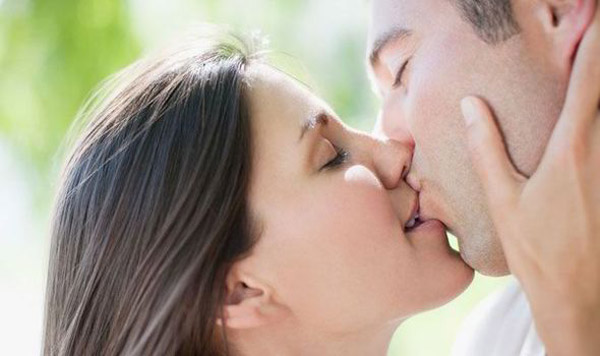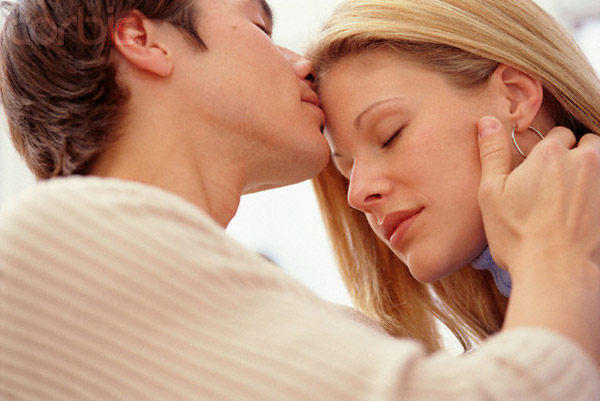
Studies of rodents — voles, specifically — have shown that oxytocin makes a mother vole become attached to its offspring, says Larry Young, PhD, professor of psychiatry in the Center for Behavioral Neuroscience at Emory University Medical School in Atlanta.
Whether a guy vole sticks around “afterward” seems to be driven by oxytocin, Young says.
Prairie voles are the only vole species that mate for life; their genetic makeup drives them to produce satisfying amounts of oxytocin. On the other hand, mountain voles are loners and breed promiscuously; they produce virtually no oxytocin.
In humans, this translates into the bonding benefits of kissing, foreplay, every bit of touching you do.
Here’s a tip: “One of most powerful releases of oxytocin is stimulation of the nipples,” Young says. It’s the same biological mechanism that triggers milk flow during nursing. Sucking triggers oxytocin release, and thus the bond is created.
Humans, interestingly enough, are the only species that includes nipple stimulation in lovemaking, he adds.
That rush that sweeps through your body, during those particularly great kisses? Fisher knows it well.
“Kissing is contextual,” she says. “A kiss can be wildly sexual, wildly romantic, or it can be deeply gratifying because it’s an affirmation of attachment. Kissing somebody for the first time, rather than the 200th or 2,000th time, creates a situation of incredible novelty.”
That rush you feel is probably from two natural stimulants — dopamine and norepinephrine, Fisher says. “They tend to be activated when you get into a novel situation.”
Fisher says there are three different stages one typically goes through:
lust — the craving for sexual gratification
romantic love — the feeling of giddiness, euphoria, sleeplessness, and loss of appetite when you meet a new love
attachment — that sense of security you find with a with long-term partner.
“Each of these is associated with different chemical systems in the brain,” says Fisher. Sex drive and lust are triggered by testosterone, in both men and women. Dopamine and norepinephrine kick in when romance begins. Oxytocin is a factor in at the attachment phase, bringing the sense of calm and peace you find with “the one.”
If you’re in the midst of a “mad love affair, it’s quite possible you simply feel levels of dopamine, that zing of romantic infatuation,” Fisher tells WebMD. “If all you’re doing is having a sexual fling with someone you like very well — but are not in love with and don’t feel attached to — then all you may feel is sex drive, the effects of testosterone.”
Unless you’re kissing the wrong person, kissing quite likely is good for us, says Fisher.
“I’ve often thought it would boost the immune system,” she says. “If you’re sharing your germs with somebody, you’re adding to your internal defense system.” Kissing also stimulates the brain, and when the experience is a positive one, “you notice it,” she says. “That translates into the euphoria, or the sex drive, or the sense of calm and peace.
“Kissing helps your state of mind,” she adds. “Infatuation can be perfectly divine. If you’re madly in love with somebody, it’s perfectly wonderful to kiss them. It creates incredible intimacy. It boosts self-esteem. It’s wonderful to be kissed by somebody.”
There’s more to kissing than meets the eye! Not that you really need an excuse (or 10) to make kissing a priority, but you’ll be smearing on your Lip Smackers and puckering up after you discover some of the amazing health benefits of kissing.
1. Boosts bonding
Whether you’re smooching a baby or making out with your spouse, locking lips promotes intimacy and boosts bonding. Dawn Maslar, a biology professor and award-winning author sums it up like this: “When we kiss, both men and women produce the hormone oxytocin. It’s often called the ‘love hormone’ because it causes us (particularly females) to bond.” The fact is, we kiss the ones we love, and love the ones we kiss!
2. Spurs arousal and enhances sex
Frequent sex can enhance everything from heart health to your self-esteem, and there’s no better primer for sex than kissing! As Carol Queen, the staff sexologist at Good Vibrations, points out, “Kissing is a powerful type of foreplay… it helps increase the chances that both partners will have a good and pleasurable erotic experience.”

3. Fights illness
It may sound counter intuitive, but swapping spit is a great way to fend off viruses — especially if all that kissing leads to sex. Research from the journal Medical Hypotheses indicates that women build up immunity against the cytomegalovirus by kissing infected partners. Another study performed at Wilkes University found that study participants who had sex once or twice a week had higher levels of the infection-fighting antibody immunoglobulin A. So if you want to make it through cold season unscathed, it’s time to pucker up!
4. Makes better marriages
Seriously. It’s not just that frequent kissers may have stronger marriages (which is great for mental and emotional health), but kissing can actually help you choose the right partner. When you kiss someone, your body is subconsciously sharing information about your respective immune systems. The technical term is major histocompatibility complex (MHC). Biologically, it’s important for partners to bring different immune system genes to the table so that their offspring will have a better opportunity for survival. So if kissing your crush immediately douses the flames of love, you might be able to chalk it up to biological incompatibility.
5. Increases happiness
Kissing releases endorphins, and to quote Elle Woods from Legally Blond, “Endorphins make you happy.” Since depression affects an estimated 17.5 million Americans and costs approximately $30 billion each year, why not give yourself a free happiness boost with a little smooching?
6. Decreases pain
During a heated, heart-racing kind of kiss, your body releases adrenaline, which can actually reduce feelings of pain. Pair that with the similarly pain-reducing endorphins that are released during physical intimacy, and locking lips gives you a double whammy for fighting that nagging headache.
7. Lowers stress
How often do you feel frazzled and exhausted at the end of the day? Blame it on your body’s natural response to stress: cortisol. Dr. Sharon Stills, naturopathic physician and upcoming author of R.E.D. Alert — Get Real and Heal, points out that “kissing lowers cortisol levels. Cortisol is our stress hormone and it has a negative effect on our immune system, endocrine system and brain health, specifically the hippocampus.” So if you can lower stress and reduce those negative effects by simply stealing a kiss with your spouse, do it as often as you can!
8. Burns calories
Sure, kissing may not burn as many calories as, say, running a mile, but it does pump up your metabolism to about twice its usual rate. Most people burn about 1 calorie a minute at rest, but according to Dr. Stills, kissing burns about 2 to 3 calories per minute. You won’t want to skip Zumba in favor of a makeout session, but next time you’re lounging around on the couch with your spouse, turn up the heat with some calorie-boosting kisses.
9. Saves face
Kissing doesn’t just burn calories — it’s a workout for your face. If you fear your jowls are starting to sag, try tightening things up with some regular, vigorous kissing. It’s the perfect non-surgical prescription to enhance your youthful appearance: safe, free and fun!
10. Turns up the fun
Speaking of fun, kissing is a blast! According to Gina Cloud, women’s health advocate and creator of GinaCology, “There are more than 30 kinds of kisses in the Kama Sutra. Kissing is such an important way of expressing ourselves, and the many different ways we can do it bring it into the realm of creative. With so many ways to kiss and express ourselves through it, fun becomes part of the experience, and fun is a great tool for happiness!”
Hope this article on benefits of kissing brings more reason to enjoy kissing this Christmas.
Disclaimer
The Content is not intended to be a substitute for professional medical advice, diagnosis, or treatment. Always seek the advice of your physician or other qualified health provider with any questions you may have regarding a medical condition.